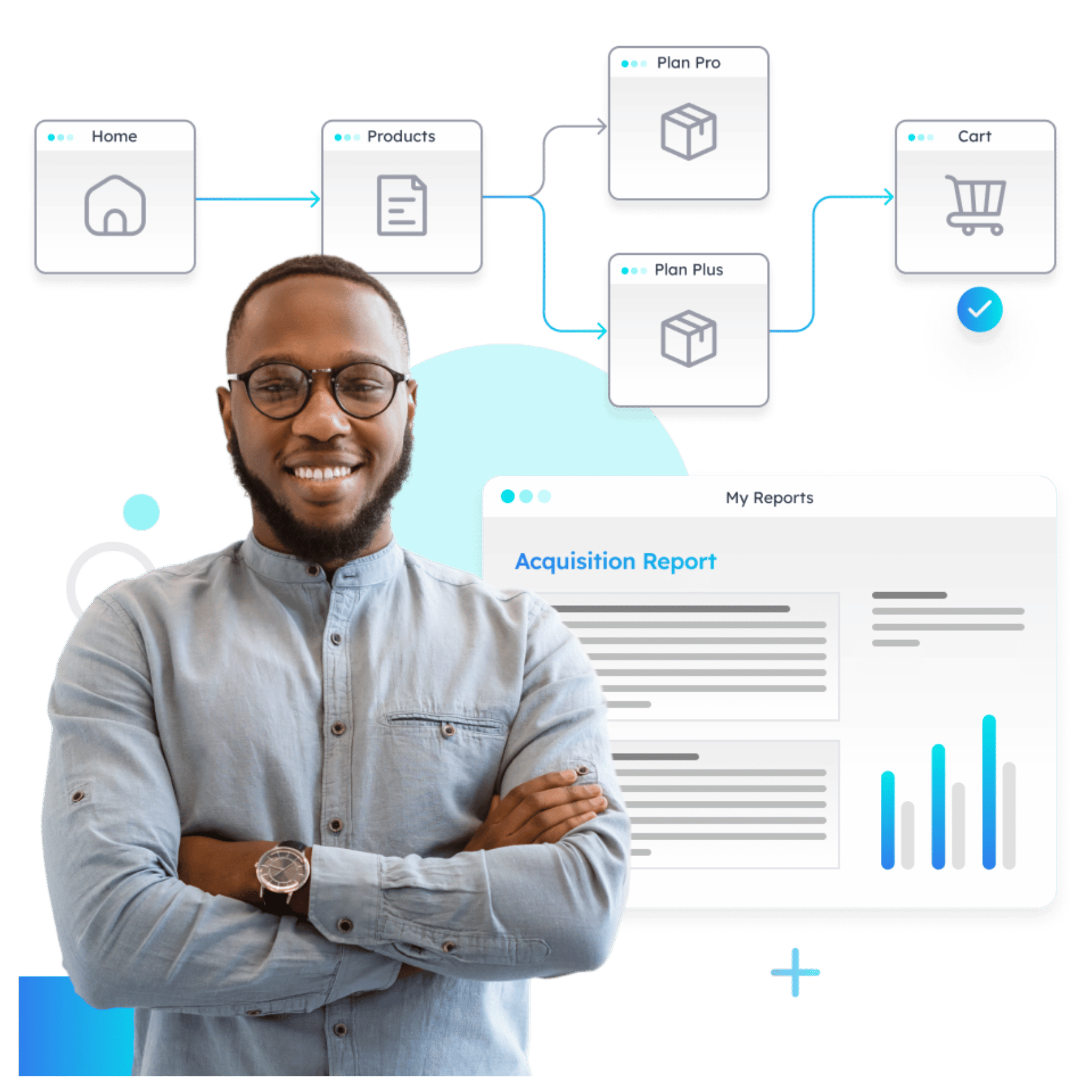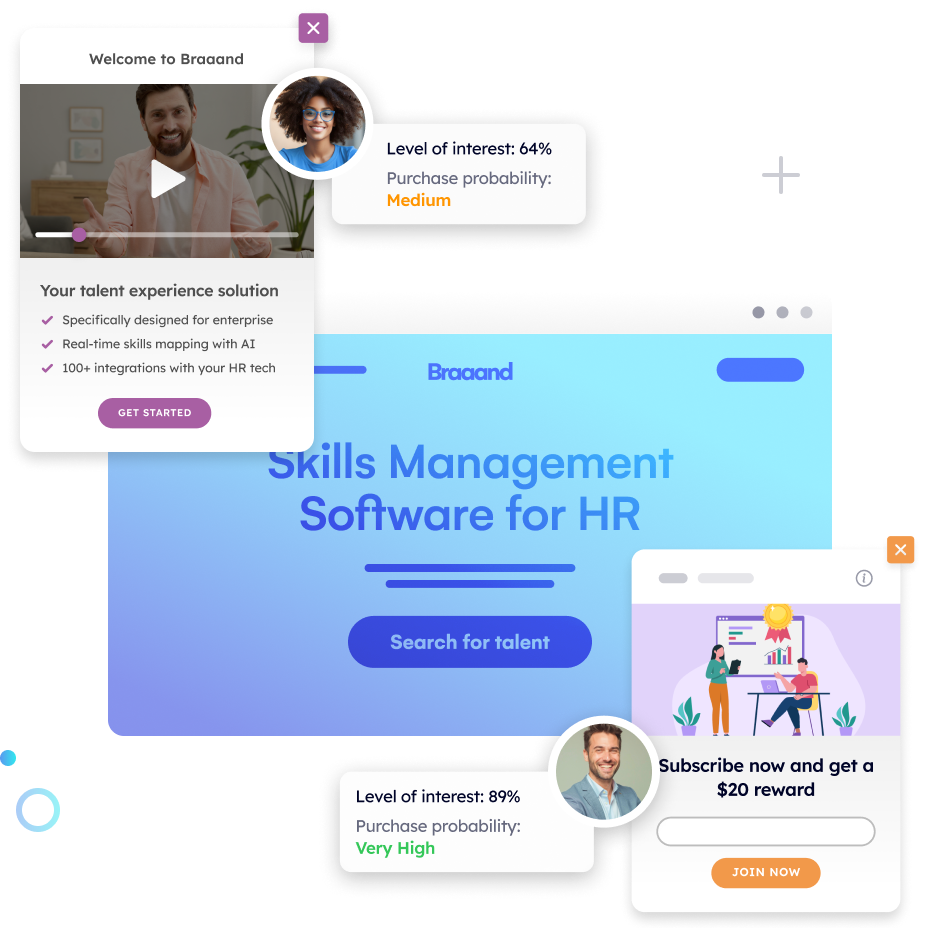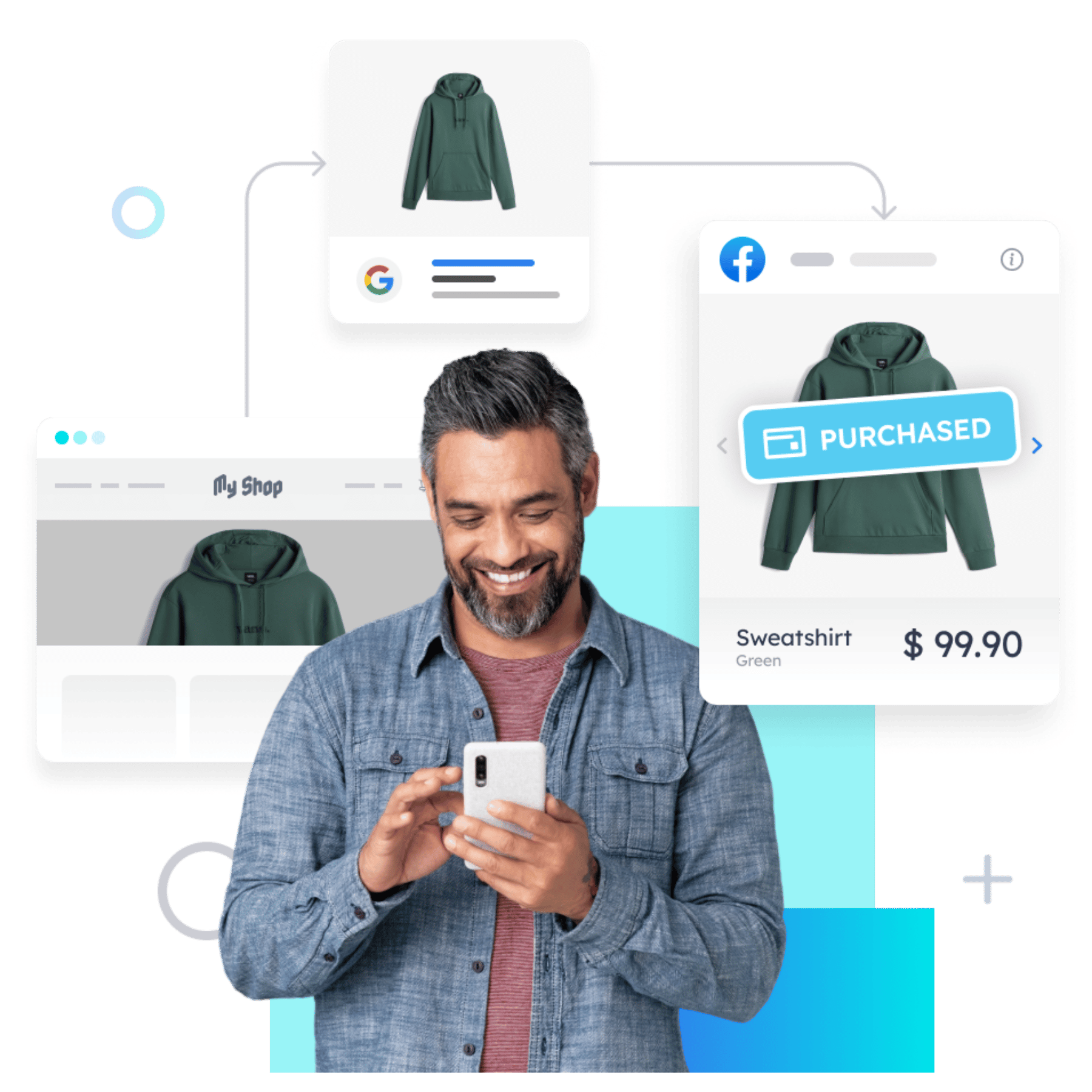
Every B2B digital marketing agency is under constant pressure to improve their clients’ conversion rates.
Whether you’re dealing with tech startups, healthcare providers, or manufacturing giants, each client presents a unique set of needs, making it critical to tailor your strategies accordingly.
Why is CRO so vital? Quite simply, your agency’s ability to improve conversion rates directly impacts client retention and overall growth. Clients don’t just want to see traffic; they want to see results. Effective CRO turns website visitors into leads and leads into loyal customers, driving tangible outcomes that justify your services. Moreover, consistently delivering high conversion rates cements your reputation as an indispensable partner, ensuring long-term relationships and steady business growth.
In this article, we’ll explore advanced strategies for boosting conversion rates, specifically tailored for B2B agencies managing a diverse client base. These tactics are designed to help you adapt to the complexities of different industries, leveraging data-driven insights and personalized experiences to deliver exceptional results.
Table of Contents
Understand Your Clients’ Buying Journeys
Every industry has its own unique buyer journey, and understanding these nuances is crucial for effective CRO. Unlike B2C markets, where purchases can be more impulsive, B2B buying decisions involve multiple stakeholders, long consideration phases, and a high demand for detailed information.
A critical component of tailoring the buyer journey is understanding the specific pain points of each industry. What problems are they trying to solve? What concerns might hold them back from making a purchase?
For example:
- Technology: The buyer’s journey in the tech industry often involves lengthy evaluation periods. Potential buyers need to understand the technical specifications, integration possibilities, and ROI.
- Manufacturing: In the manufacturing sector, the focus is often on efficiency, cost-effectiveness, and long-term reliability. Buyers need assurance that the products or services will enhance productivity and reduce costs. Your efforts should be emphasizing these benefits.
- Legal: In the legal industry, the buyer’s journey is often driven by a need for trust, compliance, and risk mitigation. Buyers need to feel confident that the services or solutions they are considering are fully compliant with regulations. The focus here should be on building trust.
- Real Estate: In real estate, buyers—whether they are investors, property managers, or homeowners—are concerned about making financially sound decisions. They want to ensure that the properties or services they’re considering will yield a good return on investment (ROI) and fit market demands.
By customizing the buyer journey for each industry, you’re more likely to guide potential customers smoothly from the awareness stage through to the decision and retention stages.
How to tackle industry-specific pain points
Effective CRO relies heavily on segmentation—ensuring that your messaging resonates with the right audience at the right time. In B2B marketing, this often requires going beyond basic demographic data.
Consider a multi-dimensional segmentation approach:
- Demographic data: This includes age, job role, and company size. For example, a small business owner will have different concerns than a procurement manager at a large corporation.
- Behavioral data: Analyze interaction history, such as which types of content a prospect has engaged with and how frequently they visit your client’s website.
- Psychographic data: Understand the values, challenges, and pressures specific to their industry. For instance, sustainability might be a top priority in certain manufacturing sectors, influencing their purchasing decisions.
By layering these data points, you can create highly targeted campaigns that speak directly to the unique needs and motivations of each segment. However, you can use other means to get more specific industry insights, for instance:
- Surveys and interviews: Directly ask current and potential clients about their challenges and what they’re looking for in a solution.
- Competitor analysis: Look at how competitors are addressing (or failing to address) common industry issues.
- Industry reports: Use third-party research to gain insights into broader industry trends and concerns.
Once you’ve identified these pain points, craft content and campaigns that specifically address them, making it clear how your client’s product or service is the ideal solution.
Understand how your prospects behave (in real time)
- Visualize how visitors move across your website
- Identify drop-offs and friction points instantly
- Turn journey data into actionable insights with AI

Tailored Industry-Specific Inbound Strategies
They say content is king, and that remains true even in the AI-dominated marketing world. For B2B clients, the key to effective content marketing lies in its relevance and specificity. Generic content rarely resonates, which is why crafting industry-specific material is crucial.
- Financial: In the financial industry, content must center around trust, compliance, and demonstrating value. Whitepapers on compliance, case studies showcasing risk management success, and market trend reports highlighting ROI potential are highly effective. Additionally, detailed guides on regulatory updates, such as GDPR or SEC compliance, can establish your client as a thought leader and trusted advisor in the financial space.
- Technology: For technology companies, inbound strategies should focus on education and technical expertise. Content like technical whitepapers, product demos, and webinars that tackle features, functionalities, and integration possibilities are invaluable.
- Real Estate: In real estate, Your content should emphasize market insights, case studies showing successful property transactions or investments, and detailed guides on current real estate trends to help buyers feel confident in their choices. Virtual tours, property listing breakdowns, and ROI calculators can also serve as valuable inbound assets, helping potential buyers visualize their investment potential.
- Legal: For the legal industry, inbound content must build trust and convey expertise. Crafting content that provides insight into compliance, risk management, and legal precedents is essential, such as detailed case studies showcasing compliance success and informative whitepapers on regulatory changes. Offering downloadable resources, like contract templates or legal checklists, can also be highly engaging for prospective clients in the legal sector.

Case studies and success stories
Nothing convinces potential clients more effectively than real-world examples of success. Case studies and success stories provide concrete evidence of your client’s ability to deliver results.
Here are some examples on how to use industry-relevant case studies to demonstrate proven results:
- Tech client: Showcase how a personalized landing page strategy led to a 50% increase in website conversions (true story!), highlighting the importance of tailoring content to the tech industry.
- Financial services client: Illustrate how targeted email campaigns improved lead quality and conversion rates, emphasizing the need for precision in highly regulated industries.
By focusing on industry-specific outcomes, you can create a compelling narrative that resonates with potential clients and drives them to take action.
Industry-Specific Funnel Personalization
Capturing prospects’ interest on a website requires a deep understanding of their needs and preferences, which can vary significantly across industries. However, one element is key to ensure high conversion rates and unique user experiences: website personalization.
This personalization should consider not only the industry your clients are in, but also the behavior of each of their users. That is possible with Pathmonk, an all-in-one solution that increases lead quality, provides unique customer experience, offers predictive analytics insights and cookieless retargeting.
This growth marketing agency generated +$1,5M in influenced revenue thanks to Pathmonk’s solution. Read this full case here.
What you can expect from Pathmonk:
- Increase in conversions or your money back. On average, our clients can expect over a 50% improvement, with some customers seeing over 8x increases. We guarantee at least a 20% growth in conversions and, if that doesn’t happen, we give your money back. That’s how confident we are (and you will be) in our solution. (Check here our conversion status in real-time)
- The best of automation. Don’t worry about wasting time with content creation. Our solution automatically creates personalized micro-experiences from your existing content.
- Higher ROI for all your campaigns. Whether you’re using paid or specific SEO campaigns, our solution works as a top layer on your website, to ensure every visitor has a higher chance of conversion, increasing ROI for all your channels.
- Cookieless retargeting. Create retargeting campaigns that truly deliver what your visitor needs to convert, all based on cookieless, GDPR compliant tracking.
Personalization is key to guarantee higher conversion rates and lead quality for all your clients. To consistently achieve impressive results, Pathmonk is your perfect match (and your client’s 😉)!
Increase +180% conversions from your website with AI
Get more conversions from your existing traffic by delivering personalized experiences in real time.
- Adapt your website to each visitor’s intent automatically
- Increase conversions without redesigns or dev work
- Turn anonymous traffic into revenue at scale

Multi-Channel Strategies Customized for Each Industry
Different industries engage with different marketing channels in unique ways. Understanding which channels work best for each client is key to maximizing conversion rates.
Identify and prioritize the most effective digital channels:
- LinkedIn: Ideal for professional services and B2B tech companies. Use LinkedIn for thought leadership content, case studies, and direct outreach to key decision-makers.
- Industry forums: Effective for niche markets like manufacturing. Participate in and advertise on industry-specific forums and communities where potential clients are likely to seek advice and solutions.
By aligning your channel strategy with industry norms, you ensure that your client’s message reaches the right audience in the right place.
Cross-channel consistency
While each channel has its strengths, consistency across all channels is critical. A unified message strengthens brand recognition and reinforces key points, no matter where the audience encounters your content.
Ensure messaging consistency while tailoring it to industry-specific contexts:
- Synchronize campaigns: Use social media automation tools to synchronize your campaigns across multiple channels, ensuring that your messaging is consistent yet adaptable to the nuances of each platform.
- Tailor messaging: For example, while the core message might be the same, the tone and format can be adjusted to fit the professional nature of LinkedIn versus the more casual vibe of social media platforms like Twitter.
Consistency builds trust, while tailored messaging ensures relevance, combining to enhance overall conversion rates.
Industry-specific retargeting tactics
Retargeting is a powerful tool for capturing leads who aren’t quite ready to convert on the first interaction. However, the effectiveness of retargeting can vary significantly by industry.
Develop specialized retargeting strategies based on industry:
- Short sales cycles: In industries with short sales cycles, such as SaaS, use retargeting to create a sense of urgency. Serve ads that highlight limited-time offers or upcoming product demos to encourage quick action.
- Long sales cycles: For industries with longer sales cycles, like manufacturing or healthcare, focus on nurturing leads over time with educational content. Retargeting ads might promote webinars, in-depth guides, or consultation offers that help move prospects further down the funnel.
By tailoring retargeting efforts to the sales cycle of each industry and each user behavior, you increase the chances of converting leads at the right moment.
2.5× better ad results with intent-based retargeting
- Retarget users based on real-time intent, not cookies
- Increase ROAS without relying on third-party tracking
- Stay compliant with privacy-first advertising standards

Advanced Lead Nurturing Strategies by Industry
Lead scoring helps prioritize your efforts by ranking prospects based on their likelihood to convert. However, a one-size-fits-all approach rarely works, especially across different industries.
Create custom lead scoring models by considering factors such as:
- Engagement level: Track interactions with content and the website. For example, a prospect who downloads multiple whitepapers may score higher than one who only visits the homepage.
- Company size: Larger deals may require different nurturing strategies, as they typically involve more stakeholders and longer decision processes.
- Decision-making authority: Tailor your approach to engage key decision-makers. If a lead holds significant decision-making power, prioritize them even if their engagement level is lower.
- Predictive lead scoring: Pathmonk assigns predictive lead scores to each visitor. These scores indicate the likelihood of a visitor becoming a qualified lead or converting into a customer.
By refining your lead scoring models to reflect the nuances of each industry, you can focus your resources on the leads most likely to convert.
Nurturing campaigns with automation and account-based marketing
In industries with long sales cycles, nurturing leads over time is crucial. Marketing automation allows you to keep potential clients engaged without overwhelming your team. In addition, account-based marketing (ABM) is all about personalization at scale, targeting high-value accounts with tailored campaigns that resonate deeply with their specific needs.
Implement drip campaigns specific to each industry’s sales cycle:
- Technology: Focus on product demos, case studies, and technical whitepapers that address specific pain points and showcase your client’s expertise.
- Professional services: Highlight thought leadership and expertise through regular emails featuring blog posts, industry insights, and event invitations.
- Healthcare: Focus on outcomes, patient safety, and compliance. ABM campaigns might include personalized case studies, whitepapers on regulatory updates, and tailored consultation offers.
- Financial services: Emphasize security, ROI, and regulatory compliance. Use ABM to deliver highly targeted content that addresses the specific concerns of financial institutions.
Automation ensures that your messaging remains consistent and relevant, keeping leads warm until they’re ready to convert. By aligning your ABM efforts with the unique demands of each industry, you increase the effectiveness of your campaigns and the likelihood of converting high-value accounts.
Now’s the time to take these insights and turn them into action—your clients, and their conversion rates, will thank you.

